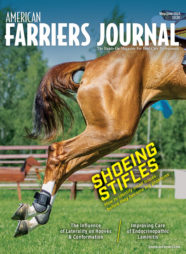The United States House of Representatives expects to take aim at horse soring for the second time in 3 years after the Energy and Commerce Committee approved legislation that aims to end the practice.
The committee voted, 46-9, to approve the Prevent All Soring Tactics (PAST) Act (H.R. 5441). If passed into law, the bill would amend the Horse Protection Act (HPA) to criminalize soring and prohibit several items that are used to artificially alter horses’ gaits or conceal evidence of soring. The HPA prohibits sored horses from participating in shows, exhibitions, sales or auctions.
Soring is the intentional application of substances or devices to horses’ limbs to inflict pain in order to achieve an exaggerated high-stepping gait in show rings.
“The practice has marred the Tennessee Walking Horse and related breeds for more than 60 years,” says Rep. Steve Cohen, D-Tenn., who sponsored the bill. “I was proud to reintroduce the PAST Act last October to finally eradicate this indefensible practice and treat horses humanely.”
Equine welfare advocates are heralding the move and urging the House to act quickly.
“Today’s strong 46-9 vote for the PAST Act shows that there is a bipartisan pathway forward to finally end the cruel practice of soring horses,” says Sara Amundson, president of Humane Society Legislative Fund. “Ending this cruelty is long overdue. We are grateful to Representative Cohen for his tremendous leadership to save horses from this brutal treatment. And we call on the House to pass the bill now.”
The Tennessee Walking Horse Celebration could not be reached for comment.
If enacted, the legislation, which has 261 co-sponsors, would prohibit the use of action devices and pads on Tennessee Walking Horses, Spotted Saddle Horses and racking horses. The legislation defines an action device as “any boot, collar, chain, roller, or other devices that encircles or is placed upon the lower extremity of the leg of a horse in such a manner that it can rotate around the leg or slide up and down the leg, so as to cause friction; or strike the hoof, coronet band, fetlock joint, or pastern of the horse.” The legislation does not consider soft rubber or soft leather bell boots or quarter boots that are used to protect the foot as an action device.
The PAST Act also would eliminate self-policing by requiring the United States Department of Agriculture to assign a licensed inspector if the show’s management intends to hire one. It also increases the penalty from a misdemeanor to a felony with a maximum of 3 years of incarceration, fines of as much as $5,000 and permanent disqualification of three-time violators.
While the House version of the bill appears to be heading to the floor for a vote, the Senate’s identical version (S. 2295) remains in the Committee on Commerce, Science and Transportation. Both versions must be passed by the respective legislative wings of Congress and signed into law by President Joe Biden before either is enacted.
The House approved the PAST Act in 2019 in a 333-96 vote. It died in the Senate.
Learn More
- Is a Solution to Soring on the Horizon?: After more than a half-century of ill-fated attempts at eliminating horse soring, is the federal government finally closing in on a solution? An answer could be on the horizon.
- House Subcommittee Green Lights Horse Soring Bill: Legislation moves on to the Energy and Commerce Committee for consideration.
- Prevent All Soring Practices Act: Read the proposed legislation that aims to end horse soring.








Post a comment
Report Abusive Comment